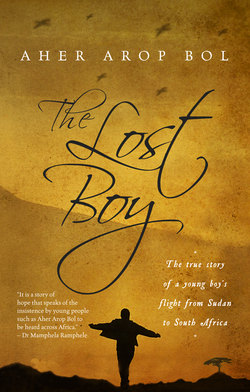Читать книгу The lost boy - Aher Arop Bol - Страница 6
На сайте Литреса книга снята с продажи.
Prologue
ОглавлениеWhat is the price of freedom? How many lives does it take to buy liberty in Sudan, where religion and politics breed war and poverty, where Muslim Arabs from the north are fighting a war against the people of the south – the animists and the Christians?
It was on 16 May 1983, in the town of Madingbor, that a hundred and five men, the founders of the Sudanese People’s Liberation Army (SPLA), took up arms against the Islamic government in the north. This was the beginning of a war in which two-and-a-half million lives have been lost, thousands of orphans abandoned and prosperity and dignity ravaged.
This is where my unfortunate peers and I were born – in the rift caused by war – and where we grew up – in the crossfire. We were victims and targets. There were eighteen thousand of us, but each suffered in isolation, without parents to help us deal with the corpses we were too weak to bury.
Watched by a world that no longer recognised the value of human life and dignity, the government forces treated the southerners inhumanly, robbing them not only of their possessions, but also of their children and their lives.
It is suffering and frustration that have compelled me to write this book – the story of my youth – and the need to plead with the mediators to not only end the war in Sudan, but to solve the issues behind it. I pray that God will make this possible, so that the people may return and live in peace once again.
This book is about my experiences and those of other minors in Panyido and other refugee camps. It tells of the agony, the hunger, disease and thirst we survived, of the relief and camaraderie we found during periods of rest, of our search for meaning and for ways in which to make this world a better place to live in.
War has scattered us to all corners of Sudan and across the world. We have learned to put our trust in God. And we honour the memory of our elders who took responsibility for us in the camps and warzones, even though they themselves were suffering.
In Sudan, land of corruption, the voices that once spoke for us have now fallen silent
From a song sung in Dinka by Deng Kout (also known as Deng Pannon)
